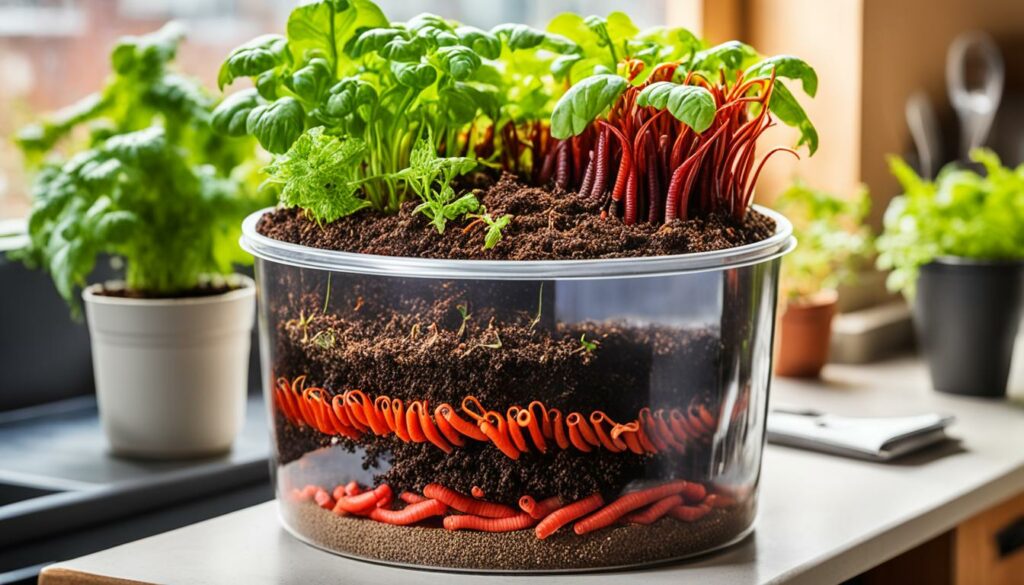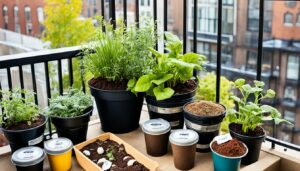A staggering 30% of what the average American household throws away is food scraps and yard waste. This organic matter, once locked away in landfills, contributes to the generation of methane, a potent greenhouse gas. However, in the concrete jungles of our cities, there’s a silent revolution taking root: urban composting. Through small space composting, even apartment dwellers can transform their biodegradable waste into valuable compost to enrich plants in their urban gardening efforts. This micro-scale transformation serves not just as a personal step toward sustainable waste management, but as a collective foothold in addressing our ecological footprint.
Despite the constraints of compact city living, innovative solutions for apartment composting allow individuals to engage in composting without necessary access to a yard or garden. Through a variety of methods that fit into a balcony, a kitchen corner, or even under a sink, anyone, anywhere can participate in a hands-on approach to sustainability. In the battle for the environment, urban composting should be on every city dweller’s radar, shaping the future of waste disposal one food scrap at a time.
Key Takeaways
- Urban composting turns limited living spaces into hubs of sustainability.
- Composting in an apartment setting challenges and changes the waste narrative.
- Small scale composting is a pivotal step for urban residents towards reducing landfill-related emissions.
- Adaptation of indoor and community composting methods ensures participation in urban ecosystems.
- Through sustainable waste management practices, city dwellers contribute to healthier soils and flourishing urban gardens.
- Participating in urban composting aligns personal habits with broader environmental goals.
The Importance of Urban Composting for Sustainable Living
As metropolitan populations swell, the traditional paradigms of waste disposal are being challenged. Urban composting emerges not merely as an innovative trend but as a necessity for sustainable city living. By transforming organic matter into fertile ground, city dwellers partake in a quiet yet significant eco-friendly composting revolution.
Reducing Your Carbon Footprint Through Composting
Everyday kitchen scraps and yard waste have a destiny far beyond landfills where they could turn into sources of potent greenhouse gas emissions. By adopting urban compost bins, individuals minimize their environmental impact, preventing the release of methane — a gas far more insidious for global warming than carbon dioxide. This critical step in managing waste effectively keeps the urban carbon footprint in check.
Benefits of Urban Composting for Soil Health and Plant Growth
Urban landscapes often suffer from soil that is devoid of life — compacted, nutrient-depleted and lifeless. The introduction of nutrient-rich soil, a direct offshoot of composting, invites a revival of soil health and plant vigor. Rich in organic matter, compost serves as a natural fertilizer, encouraging robust plant growth and contributing to a more verdant and resilient urban gardening scene.
Small Scale Composting Impact on Reducing Landfill Waste
Even on a diminutive scale, the collective efforts in using urban compost bins effectuate a substantial decrease in the volume of organic waste sequestered within landfills. This significant diversion aligns with the principles of eco-friendly composting, not only clearing the path for reduced landfill reliance but also for the abatement of greenhouse gas emissions, sustaining the quality of our air and contributing to a cleaner, greener planet.
“When you compost, you give new life to the food that once nourished you. It’s a cycle of giving back to the Earth that sustains us all.”
As a visual testimony to the surprising scale of impact an individual can have, below is an insightful comparison of traditional waste disposal versus eco-friendly composting and its effects on greenhouse gas emissions:
| Waste Disposal Method | Annual Greenhouse Gas Emissions (kg CO2 equivalent) | Volume of Waste Reduced (cubic yards) |
|---|---|---|
| Traditional Landfill | 2,000 | 0 |
| Eco-Friendly Composting | 200* | 2 |
*Estimated values based on small-scale urban composting.
It’s evident that while each individual’s effort in urban composting may seem like a drop in the ocean, the cumulative effect is more akin to a transformative wave, washing over cities with the promise of a greener, more sustainable future.
Urban Composting Techniques and Methods
City living often brings the misconception that composting is a far-fetched concept due to space constraints. However, innovative urban composting methods have emerged, making it possible to transform organic waste into valuable compost within the bustling urban landscape. From the use of specialized bins to community-backed initiatives, residents of apartments and condos can now contribute to eco-friendly waste solutions right from the comfort of their homes.
Indoor Composting Solutions for Apartments and Condos
Maximizing minimal spaces, urban compost bins designed for indoor use offer a convenient and odorless way to compost in the city. Compact and aesthetically appealing, these bins can fit neatly under a kitchen sink or on a balcony, ensuring that even the smallest apartments can take part in sustainable waste management.
Vermicomposting: Harnessing the Power of Worms in Urban Environments
Vermicomposting uses red wrigglers to break down kitchen scraps into nutrient-rich compost. This method is particularly suited for indoor settings, being both space-efficient and highly effective. The resulting compost is excellent for urban gardens, introducing a circulation of organic matter that benefits both plants and the environment.

Community-Driven Initiatives: ShareWaste and Compost Club Participation
Community composting has grown, with platforms like ShareWaste fostering a network of eco-conscious individuals. Through community composting, those lacking personal composting capabilities can still partake by linking up with nearby community gardens or neighbors who compost, thereby cultivating a shared responsibility towards an eco-friendly cause.
Hi-Tech Composting: Electric Indoor Compost Bins Explained
For a more tech-savvy approach, electric compost bins are on the rise, providing an automated and speedy processing of kitchen waste. These high-tech appliances can turn scraps into compost in a matter of hours, demonstrating the harmonious blend of technology and environmental stewardship.
Utilizing Compost Drop-Off Sites and Local Pick-Up Services
Many urbanites benefit from compost drop-off sites typically found at farmers’ markets or through local pick-up services. These options act as a portal for individuals to contribute to large-scale composting operations, reinforcing the community’s collective effort toward eco-friendly waste solutions.
Conclusion
In the dynamic landscape of city living, urban composting stands out as a beacon of sustainability, offering residents in condensed habitats a compelling way to contribute to the health of their environment. Small space composting techniques have taken root in places where traditional methods might falter due to limited square footage. Through ingenious solutions, such as apartment composting systems, city gardeners can transform food scraps into life-giving soil, proving that space constraints need not impede one’s journey towards sustainable living.
The urban composting movement is multifaceted, embracing not just individual efforts, but community composting as well. It’s a testament to how local collaborations amplify the collective benefits of eco-friendly composting. By incorporating urban compost bins into their routines, urbanites are forging a path to urban gardening success while concurrently addressing critical waste management concerns. It’s not only about growing plants but nourishing a culture of awareness and action that values eco-conscious choices over convenience.
Ultimately, as we embrace these environmentally responsible practices, we move closer to actualizing a vision of urban sustainability where every organic scrap is seen not as waste, but as a resource. By integrating sustainable waste management principles with practical methods like vermicomposting and leveraging community resources, residents are laying the groundwork for greener cities. Embracing these eco-friendly systems reaffirms our commitment to nurturing not just urban green spaces but also a vibrant, regenerative urban ecosystem for generations to come.








